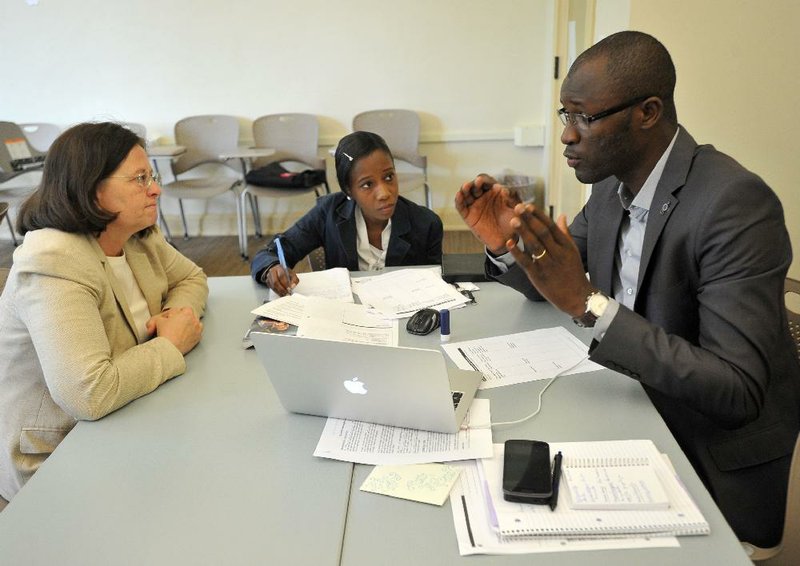The problems of Africa don't intimidate the 25 Young African Leaders now at the University of Arkansas at Fayetteville.
But they also know the challenges that await them when they return home.
Yabah Berthe Bognini, 34, wants to help women with childbirth injuries in Ivory Coast, her home country torn in recent years by civil war.
"Most of these women are rejected by their community," Bognini said.
Obstetric fistulas, caused by long labor, bring on incontinence, and the women often are left alone to fend for themselves, she said. Doctors can help, Bognini said, but the women also need other assistance.
"It's a kind of social death, so how to empower these women to give them the tools, the skill to be independent, to have an activity?"
Like other program participants on the UA campus for six weeks, she brings plenty of determination to improve Africa from within.
"African problems will be resolved by the young Africans," said El Hadji Abou Gueye, 33, a Senegalese entrepreneur with political ambitions.
The group is the first class of fellows in the U.S.-sponsored flagship program of the Young African Leaders Initiative.
UA is one of 20 sites hosting 500 "best of the best" leaders chosen from some 50,000 applications, said Leyah Bergman Lanier, director of the Spring International Language Center at UA and a program instructor.
Participants, all from 25 to 35 years old, have varied backgrounds. Several hold advanced degrees. Most have been in leadership roles in business or government, sometimes for several years.
President Barack Obama started the initiative, with the group headed to Washington, D.C., this month to meet the president. As noted on the program's website, almost 30 percent of Africans are between 10 and 24, with Africa expected to grow rapidly in the coming decades.
"I think other countries -- not just U.S.A., but you can say China, you can say India -- the eyes are on Africa," said Carla Santos de Carvalho, a gender activist and university leader in the island nation of Cape Verde.
At UA, fellows study public management, one of three tracks of study. Bergman Lanier said she pushed for UA to be selected, calling the U.S. State Department and working with the program's main grant recipient, a nonprofit known as IREX, to get UA selected as a site.
"I knew it would be a good fit for the university because the university is committed to international education," Bergman Lanier said. The group will also visit the UA System's Clinton School of Public Service in Little Rock.
One recent class led by UA political science professor Margaret Reid focused on writing a "needs statement," part of a typical grant application. In small groups, program fellows worked on describing various problems affecting people at home.
The purpose of the class "isn't necessarily that they come and learn models and take them home," Bergman Lanier said, "but rather that they have each other as models and what they're doing -- as well as what we're doing -- to try and look at better ways of doing things in their own communities and culture."
Africa contains within it many differences and divisions, she noted. The 25 fellows come from 18 different countries.
"Learning what those specific differences are, but then watching them learn to work together has been pretty eye-opening," said Lindsey King, a program coordinator for the group at UA. "In the beginning, they're all leaders, so they all wanted to be heard, and now they're learning to listen."
Part of the experience involves shared time living together, with the group staying at an on-campus fraternity house.
"I think all of us, we are here, we have this ambition to influence change," said Santos de Carvalho, 34. She wants to reduce violence and improve education in Cape Verde.
"In my country right now, boys are leaving schools to form gangs," she said.
Since their arrival in mid-June, outings have included a community service activity at the 7 Hills Homeless Center in Fayetteville.
"Doing these kind of activities for free, it's amazing," said Bognini, 34. "In Africa, we can't do things like that for free." Poverty might lead many to demand payment before helping, but "we need these kinds of activities in Africa," she said.
Bognini works for an Ivory Coast government commission helping to oversee reconciliation efforts after years of civil war within the last decade.
She said she's optimistic about her plan to start a nongovernmental organization to help women with fistulas.
"I think that most of the people in my country, they are aware of the problem. But they don't know where to start and they don't know who can help them," she said.
Gueye said he wants to be mayor of a suburb of Dakar, the capital of Senegal. His "needs statement" referred to youth unemployment, with his goal to provide at least a small payment for volunteers participating in a recycling program he hopes to establish.
"I refuse to be the future of my country. I am the present of my country," Gueye said.
NW News on 07/07/2014

